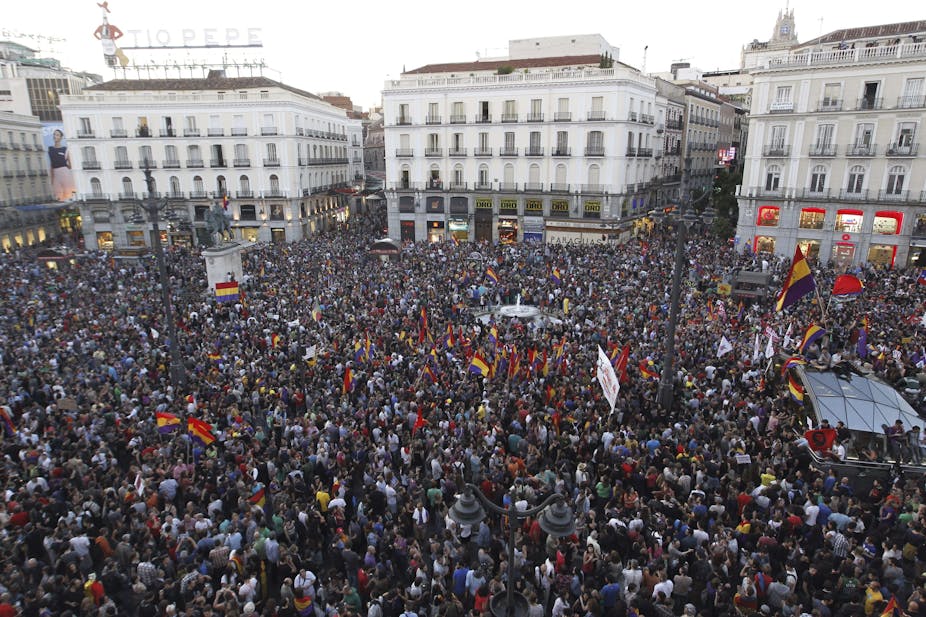When King Juan Carlos addressed the people of Spain on the day of his abdication, he spoke of his desire, nearly four decades earlier, to give Spanish citizens control of their destiny and to create “a modern democracy, fully integrated into Europe”. Despite the king’s rapidly fading popularity in recent years, this is still his predominant image: Juan Carlos, father of Spanish democracy, even if it is now tarnished by family members mired in corruption scandals and the now-infamous disastrous elephant shoot in Botswana.
These contradictions may be less surprising if we look at his early life, as well as his role during the Spanish transition. Brought up in Spain, away from his family from 1948 he was, from the age of nine, educated on terms set down by the dictator, General Francisco Franco. This odd arrangement ultimately ensured that the boy would be the generalísimo’s heir, and so the family consented, seeing a path back to the throne of Spain. As the king later remarked, in his family, “being king is a profession”.
The values Franco instilled in his young protégé were primarily military. The young prince was educated at the military academy in Zaragoza, but also spent time at the naval and air force academies and so could properly claim a knowledge of all the armed forces. This traditional education suited a military dictator. But it also groomed Juan Carlos for the role of soldier-king, which he would play to extraordinary effect during the attempted anti-democratic coup of 23 February 1981.

The soldier-king was, though, one of very few available options for a modern monarch. And, as Juan Carlos’s education showed, it could operate within a democratic or a dictatorial context. His reputation as the founder of Spanish democracy rests in part on the fact that he inherited absolute powers from Franco, but chose not to exercise them, instead helping to broker a negotiated, elite-led process of democratic transition conducted entirely within the existing, Francoist legality. In so-doing, Juan Carlos was also constructing a constitutional monarchy, and what alternative was there for a king in late 20th century Europe? If he was to keep his throne, he had to redefine the terms on which he occupied it.
In reinventing the constitutional monarchy, Juan Carlos is likely to have had the fate of his brother-in-law, ex-king Constantine of Greece, at the forefront of his mind. A series of ill-judged political interventions had seen the Greek king forced into exile in 1967 by the colonels’ dictatorial junta. The return of democracy after 1974 did nothing to aid his case; Constantine was dethroned by a referendum in the same year and was later stripped of his Greek citizenship (and his properties) in 1994.
Franco’s death in November 1975 meant that, overnight, Spain became the only monarchy in southern Europe (excluding Monaco). But it was not the only incipient democracy; Portugal’s “revolution of the carnations” had begun on 25 April 1974. Republican democracy was established in both countries, and in Portugal’s case at least, the process was firmly driven from below.
In southern Europe in the 1970s, Spain’s transition to democracy was not unique. Its singularity came from the manner of the transition, its legal, peaceful, top-down nature that saw, in effect, democracy constructed by non-democratic means. In this process, the role of the king was crucial, for the crown possessed the authority and legal means to circumvent the Francoist apparatus. Hence the view that sees Juan Carlos as, in the words of an editorial in Spain’s El País, “a necessary king”. But to see this as bringing about democracy in 1970s Spain is to confuse process and outcome.
Democracy returned to southern Europe at a point when the old authoritarian institutions became almost completely out of step with civil society. Nor did business and financial interests, now looking to the expanded European markets of the EU, have any real investment in maintaining dictatorial regimes. Many within the Francoist state realised this, including the king, his advisors, and the man he picked as prime minister, Adolfo Suárez. But there was also a real pressure from below and it was this that ultimately brought about democracy, just as it did in Greece and Portugal.

The king’s skill was to secure his position as monarch and redefine this constitutionally. Here, his position as commander-in-chief of the armed forces was key. During the attempted coup of 21 February 1981, with parliament held hostage by armed civil guards, and tanks in the streets of Valencia, he addressed the nation on television, ordering the troops back to barracks. The captain-general of Madrid, who secured the capital, simply obeyed Juan Carlos. “The king ordered me to stop the coup,” he said. “If he had ordered me to assault the Cortes, I would have done so”.
As so often in Spain’s transition, democracy was secured by non-democratic means. But the failure of the 1981 coup did ensure that, while King Juan Carlos did not single-handedly return democracy to Spain, he was Spain’s first genuine constitutional monarch.

